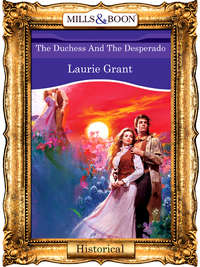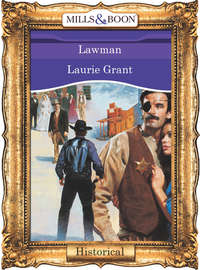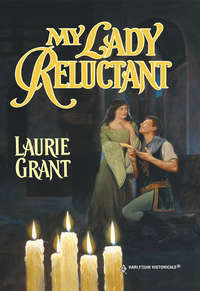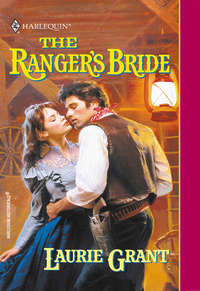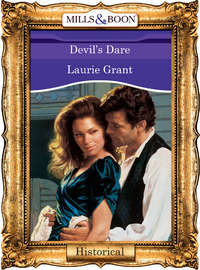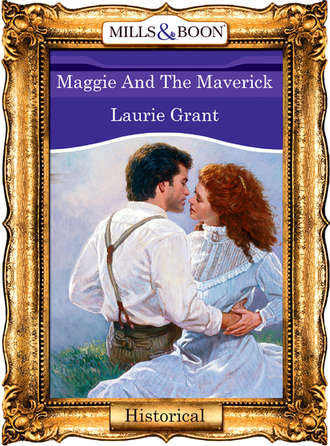
Полная версия
Maggie And The Maverick
Goodness, she’d better stop pondering over her employer and get back downstairs! It was surely more like ten or fifteen minutes since she’d come up here!
“Took you long enough,” groused Devlin, barely glancing up as she reached the bottom of the stairs. He was hunched over the table, a stubby pencil grasped in his right hand, and as she approached, she saw that he’d already covered nearly a full page with his untidy scrawl. She saw him stop and glance at the telegraph transcription, and then his pencil began to race over the paper again.
“I’m sorry, sir, I—”
“Here,” he said, thrusting the now-filled sheet of paper at her. “You can start setting the type for this page.”
The first thing she was going to have to learn how to do was read his writing, Maggie thought with dismay as she peered at the slanting scrawl. It was nothing like the neat copperplate of his letter to “M. L. Harper.” Had he gotten the local schoolmarm to write that letter for him?
“What’s wrong?” he demanded, peering at her and letting the pencil fall with a soft clatter to the desk. “Are you disagreeing with my headline story already? I didn’t employ you to pass judgment on my opinions, Miss Harper, I pay you to run the press,” he growled.
“No, Mr. Devlin,” she began, “that is, I don’t know if I disagree. I—I’m not used to your writing as yet. But just give me a minute or two, and let me study it. I’ll ask you if I can’t decipher a particular word,” she promised, evad ing the hand that would have snatched the paper back from her.
Sure enough, once read in the light of the window, the individual letters began to sort themselves out and form into words and phrases, though it was particularly tough to tell one vowel from another, for they all appeared to be the same indistinct near-loop shape. Hopefully the arrangement of his flamboyantly slanted consonants would give her the clues she needed.
She turned her attention to the California type cases, the trays of metal letters of various sizes and fonts. At least the standard nine-point type she’d need for the newspaper was arranged alphabetically, she discovered. When she had more time she would arrange it the way compositors traditionally did—capital letters alphabetically in cases on the right, and small-case letters on the left, with the most frequently used ones in the handiest spaces.
She began setting up the rows of type that would become the opening lines of the infant newspaper: the masthead, with the large Gothic capitals proudly proclaiming the name of the paper as the Gillespie Springs Gazette; the motto Forever The Truth For Texas right underneath; and then the date April 4, 1869, followed by the words Premier Edition and Garrick Devlin, Editor And Owner.
That portion completed, she laid out the very first headline: Radical Republicans Choose E. J. Davis As Their Gubernatorial Candidate, Former Union Brigadier General Is Certain Victor With General Reynolds As Ally.
Afternoon drifted into evening as she painstakingly set in rows of metal and wood type the words Garrick Devlin was feverishly scribbling at his desk. Every so often he would hand her another page and ask her how she was coming, and if she thought she was going to be able to finish tonight. Naturally, she could not lay out the pages as fast as he could write, but she kept working, ignoring the ache in her back and the throbbing of her head.
“Well, are you going to tell me we shall have to put off publication for another day?” Garrick Devlin inquired some time much later, coming to stand next to where she was working on the second page.
Maggie looked up in surprise. “Why, no, sir,” she said, glancing at the watch she’d pinned to her bodice. Seven o’clock, and she was only half done! “No, I promised you this would be ready by morning, and it will be, even if I have to stay up all night, just as I said.”
Was that approval that had flashed so briefly in those cold blue eyes? No, surely she had imagined it!
“Well, Miss Harper, I am all done with the writing, and my stomach is growling.”
“Go ahead, go have something to eat,” she said without looking up. “I’m not hungry after that big midday dinner,” she lied. And then, to her mortification, her own stomach protested, too, loudly enough that Garrick Devlin heard it.
“Why, Miss Harper, I believe you are prevaricating,” Devlin mocked, a small smile playing about that arrogant mouth.
“Well, perhaps a little,” she admitted, “but I really am eager to get this done, just as I promised. Perhaps I will eat something before we start running off copies.” She’d need some nourishment before lifting those heavy trays of type and repeatedly pulling back the devil’s tail—the lever that rolled the bed of type under the platen.
“Then I shall have to go over to the hotel and purchase something for both of us to eat, or no doubt I’d return to find you swooned on top of the press,” he taunted her in that molasses drawl of his.
“It’s not necessary.”
“Certainly it is. I promised Jovita I would feed you, and so I shall. I, Miss Harper, do not prevaricate. I’ll return in a few minutes.” With that, he made his way to the door and went out.
Chapter Six
Garrick peered at his pocket watch, willed to him as the eldest Devlin son by his father. It was 3:00 a.m.
“One hundred copies,” he murmured as Margaret Harper pulled the last one off of the press. “I believe that will be enough for our first edition, Miss Harper, so I’ll bid you good-night.”
She stared back at him as if dazed, her green eyes dull with fatigue, her shoulders slumping slightly, and he knew a moment’s shame for having worked her so hard on the same day she had arrived on the stage. As soon as he’d finished writing the copy, he’d helped with as much of the work as he could, and bad been shocked by how heavy the typeset pages were once the tin letters were locked together. Why, they must weigh a good thirty pounds each, and Miss Harper hadn’t even mentioned it, let alone batted her eyelashes at him and praised his manly strength the way Cecilia used to do when she wanted something heavy toted for her.
Then, after some quick instruction by Miss Harper, he’d done the tedious “pulling of the devil’s tail” and run off copies of the Gazette while she belatedly ate her supper. His right shoulder throbbed as a result, and he marveled that she, of much slighter build, had yet to utter a first complaint.
Perhaps the Yankees were built of sterner stuff than he’d imagined. “You’ve worked very hard today, Miss Harper. That is to be commended,” he said. “If it hadn’t been for that story, of course, we needn’t have been in such a hurry, but this information can’t wait. Naturally I shan’t expect such a frantic pace out of you normally.”
He saw her chin go up again, the shoulders straighten and the light of battle rekindle those green eyes.
“Nonsense, Mr. Devlin,” she said briskly. “Every good newspaperman—or woman—thrives on the excitement of getting such a big story to its readers. Don’t fear you have to spare me just because I’m a woman. I’m used to working as hard as any man.”
He knew a grudging admiration for her stubbornness. Fine—if she wouldn’t complain, he’d be damned if he’d let on how much he hurt.
“Well and good, Miss Harper, but surely you had better retire for the night. It will be morning before you know it, and we’ll need to start planning the next edition.”
“Oh…oh, of course,” she murmured, as she turned and walked toward the stairs. “Good night, sir.”
She hesitated as she passed the remains of their hurried supper lying on the table, the grease-stained brown paper wrapping and a piece of crust from a steak sandwich. “I-I’ll just clean this up before I go upstairs, Mr. Devlin.”
“Never mind, Miss Harper, I’ll dispose of it,” he said firmly.
“Very well. Good night, then, Mr. Devlin.” He heard her trudge up the stairs, pull the creaky door open—he’d have to oil that hinge, he thought—and shut the door quietly behind her. A moment later an audible click announced that she’d locked the door from the inside.
He turned and surveyed the pristine black-and-white stack of papers. The ink still gleamed wetly on the top copy. Each one was a big sheet of paper folded in half, forming four pages filled top to bottom with his eloquent reporting of the story from Austin and his opinions about it. In just hours the townspeople would eagerly snatch copies from that stack, and his career as the respected editor of the Gillespie Springs Gazette would officially begin.
The moment seemed incomplete to Garrick. If his new employee had been a man, as he’d been expecting, he would have invited him to share in a celebratory glass of whiskey. He’d stashed a bottle in his desk for just such an occasion as this, the completion of the very first issue of the town’s first newspaper. But of course one did not invite a lady—or even a presumptuous Yankee woman such as Margaret Harper—to share a drink.
The only sort of female who drank liquor was a sporting woman, and he did not associate with those, even when his long-frustrated sexual needs clamored for satisfaction. No, he wouldn’t pay for what passed as loving, knowing that if he did find a woman who would provide such services to a cripple, she’d either charge him double or do it out of pity, then laugh about it later with her sisters in the oldest profession.
There was no help for it—he’d have to drink alone, he mused, retrieving the whiskey bottle and a glass from the desk drawer and pouring himself a two-finger measure. The amber liquid burned a fiery path down his throat and hit his stomach like a glowing ember.
The sole of his right foot and his lower calf had begun to throb hours ago, just as they always did when he’d done too much. Now he was exhausted and could no longer ignore the pain to his shoulder throbbing in counterpoint, even with the whiskey warming his stomach. Absentminded with fatigue, he reached down with his fingers to massage his leg, only to recoil when his hand met the hardness of wood instead of the softness of flesh and bone.
Damn it all to hell, when was he going to stop having pain in a limb that hadn’t been there for over three years? His eyes darted to the top of the stairs, afraid that Miss Harper had managed to silently creep back out onto the stairway and witness the way the phantom pains had made a fool of him again, but his eyes found only lamplit shadows up there.
Relieved, he gulped the rest of the whiskey, and after placing the glass and bottle back into the desk drawer, he grabbed four Gazettes off the top of the stack to take home. He’d give one to Jovita, one to Johnny—he smiled as he pictured his son pretending to “read” it—send one to his mother and keep one for posterity. He set another one aside, knowing Cal would come directly here for his copy.
Garrick let himself out into the cool spring night. Suddenly he couldn’t wait to reach his rented house, which stood over on South Street behind the bank. In the privacy of his own room, he could pull off the damned wooden leg that daily rubbed the flesh of what was left of his upper leg until the end of stump was irritated raw, sometimes even streaked with dried blood. Tonight would be one of those times, he guessed, for he’d been on his feet far too long today. When he sponged away the dark, dried blood, the stump would burn as if the cloth were made of nettles instead of cotton, and he’d have to set his teeth against the pain so that he wouldn’t wake Johnny and Jovita, sleeping in the other rooms.
Sometimes removing his wooden leg and washing the stump was not enough to soothe the pain, and he’d have to reach to the bottom of the brass-bound trunk in which he kept his old uniform and firearms for the bottle of laudanum he kept hidden there. But he hated the sense of weakness he felt after drinking from that bottle. And he knew that once he slept after sipping the liquid tincture of opium, his dreams would be nightmares, full of horrifying sounds and the faces of the dead. He’d be even more afraid to use the drug now that he knew of Cecilia’s death. He didn’t want to see the ghost of his dead wife floating toward him as he slept, her golden tresses dull with mold.
He remembered seeing what laudanum had done to other men, too, turning them into helpless, sniveling addicts for the rest of their miserable lives. Maybe he was better off not using it, and just putting up with the pain, he decided, even as every step that brought him closer to home became an agony in itself.
“Here’s my nickel, Garrick. Sell me a paper,” the tall fellow wearing a star on the left side of his vest and a patch over his right eye said with a grin, leaning on the counter in the Gazette’s office the next morning.
This must be Garrick’s brother Caleb, the sheriff, Maggie thought as she looked up from where she was doing the layout of a rate card for advertising in the Gazette. She saw the same lean, high-cheekboned features, though Caleb Devlin’s upper lip was graced with a dashing mustache, where Garrick’s was austerely bare. Caleb’s one good eye was of a paler hue than Garrick’s, almost a gray-blue, but both brothers possessed faces that reflected the presence of pain, past or present.
“Cal, I can’t take your money,” protested Garrick, returning the grin. “You’re my brother! I saved you a copy, gratis.”
“Aw, brother, you’re never gonna be a rich newspaperman if you keep refusing money—” the tall lawman began, and then Maggie saw him notice her.
In an instant, he swept off his broad-brimmed hat and smiled at her. “Sweeney told me about your new pressman—um, lady,” he said, speaking to his brother, a teasing glint in his eye.
“Yes…M. L. Harper was not quite as I expected him to be,” Garrick replied dryly. “Miss Harper, this is my brother, Cal Devlin.”
Maggie stepped forward, encouraged by the sheriffs warm smile, and offered her hand.
“Mr. Devlin, I’m Margaret Harper.”
He took her hand and shook it. “Miss Harper,” he murmured in that molasses-and-honey drawl that flowed from Southerners so effortlessly. “Call me Cal. Welcome to Gillespie Springs. I see you still have your head, so my big brother must not have bitten it off yet—good! Don’t let him. His bark is worse than his bite, anyway. I hear you have lots of newspaper experience, so my brother’s lucky you answered his ad. Don’t let him forget it.”
“Cal, if you’re quite finished subverting my authority over my employee,” Garrick said with heavy irony, “we have work to do here, and—”
The bell over the door tinkled again, and a dark-haired woman stepped inside, a joyous smile lighting her attractive features.
“Garrick, I just heard the newspaper was out!” she announced, coming forward to stand by Caleb’s side. “Congratulations on the start of your business!” She planted a kiss on Garrick Devlin’s cheek.
“Why, thank you, Olivia…” Garrick murmured, reddening slightly.
Maggie, still standing near her employer, felt her jaw drop for a second. Wasn’t Garrick Devlin wearing a black armband as a sign of mourning for his wife? Who was this woman?
Then Maggie saw Cal Devlin place his arm around the woman’s waist and smile down at her momentarily before turning back to Maggie.
Конец ознакомительного фрагмента.
Текст предоставлен ООО «ЛитРес».
Прочитайте эту книгу целиком, купив полную легальную версию на ЛитРес.
Безопасно оплатить книгу можно банковской картой Visa, MasterCard, Maestro, со счета мобильного телефона, с платежного терминала, в салоне МТС или Связной, через PayPal, WebMoney, Яндекс.Деньги, QIWI Кошелек, бонусными картами или другим удобным Вам способом.



